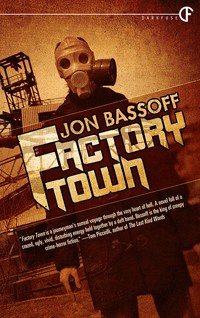Author Jon Bassoff is well known on the pulp scene as the founder of indie publisher New Pulp Press, though he’s recently sold the firm. Anyone familiar with their releases will not expect Bassoff to stick rigidly to genre conventions. Indeed, Factory Town walks the line between horror and crime in a way so many do these days. We took a brief look at Bassoff’s Corrosion last year, and this year we have reviewed books by Adam Cesare, Lee Thompson, and Ari Marmell which mix the gritty with the gruesome. None, however, is as challenging as Factory Town. The novel is bookended by a prologue and epilogue in which a desperate man gains entrance to a stranger’s home, and being unable to find what he’s looking for, shoots himself in the head. The rest of the book is less straightforward.
Factory Town itself is an urban nightmare, a post-industrial wasteland of burnt out cars and abandoned buildings, whose inhabitants work a never ending cycle of shifts at the giant factory. What is manufactured is never made clear and they spend their free time cowed by the henchmen of a menacing figure known as The Cowboy. Into this nightmare arrives Russell Carver, searching for a missing girl called Alana. With only a photograph of the girl to help him, and no real understanding of how he came to be involved in looking for her, Carver stumbles from one chance encounter to another through a parade of freaks, deviants and criminals.
Carver’s concerns are frequently dismissed by the town’s inhabitants and his questions are met with misdirection or hostility for the most part. Despite the threatening and depraved scenarios he comes across, including rape and torture, a travelling freak show, and mass suicide, he seems oddly disconnected from his surroundings. He is witness to what happens but is unable, for some reason, to really influence events. It’s as if Factory Town were a stage, its population actors determined to tell their story regardless, and with Carver the audience.
The author does his best to keep you unsure of what is happening and off balance. Carver arrives with no back story, and since he is narrator, the disconnection with events he feels is mirrored in your thoughts. Bassoff uses other devices to heighten the odd sensation of being once removed from reality. Time seems to move in a non-linear way, buildings which should be small houses open out into cavernous rooms, people appear in places they shouldn’t be, and each interaction Carver has seems to have no connection to the last. In other words, this is as far from a conventional narrative as I could imagine. There is a real danger in the opening chapters that you could end up putting down the book in frustration. Were it not for the buzz growing around this book, I might have done so myself, and that would have been a great shame.
The obscure nature of Factory Town is not an author showing off or being deliberately pretentious, but a stylistic device which adds to the emotional impact of the payoff, and absolutely essential to the way Jon has chosen to tell this story. To say more would be to spoil things, but it is safe to say that the author has found a way to take a horrible situation, convey the awfulness of that situation, and produce a novel that is confusing, scary, but at its end wondrously life-affirming. This is literary alchemy, in short.
Factory Town is released 7 October.
DarkFuse
Print/Kindle
£2.42
CFL Rating: 5 Stars
